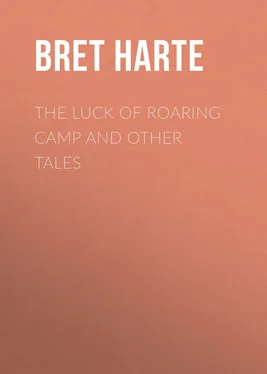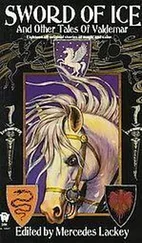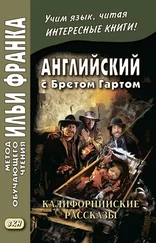Bret Harte - The Luck of Roaring Camp and Other Tales
Здесь есть возможность читать онлайн «Bret Harte - The Luck of Roaring Camp and Other Tales» — ознакомительный отрывок электронной книги совершенно бесплатно, а после прочтения отрывка купить полную версию. В некоторых случаях можно слушать аудио, скачать через торрент в формате fb2 и присутствует краткое содержание. Жанр: foreign_sf, literature_19, foreign_antique, foreign_prose, на английском языке. Описание произведения, (предисловие) а так же отзывы посетителей доступны на портале библиотеки ЛибКат.
- Название:The Luck of Roaring Camp and Other Tales
- Автор:
- Жанр:
- Год:неизвестен
- ISBN:нет данных
- Рейтинг книги:5 / 5. Голосов: 1
-
Избранное:Добавить в избранное
- Отзывы:
-
Ваша оценка:
- 100
- 1
- 2
- 3
- 4
- 5
The Luck of Roaring Camp and Other Tales: краткое содержание, описание и аннотация
Предлагаем к чтению аннотацию, описание, краткое содержание или предисловие (зависит от того, что написал сам автор книги «The Luck of Roaring Camp and Other Tales»). Если вы не нашли необходимую информацию о книге — напишите в комментариях, мы постараемся отыскать её.
The Luck of Roaring Camp and Other Tales — читать онлайн ознакомительный отрывок
Ниже представлен текст книги, разбитый по страницам. Система сохранения места последней прочитанной страницы, позволяет с удобством читать онлайн бесплатно книгу «The Luck of Roaring Camp and Other Tales», без необходимости каждый раз заново искать на чём Вы остановились. Поставьте закладку, и сможете в любой момент перейти на страницу, на которой закончили чтение.
Интервал:
Закладка:
The next day Cherokee Sal had such rude sepulture as Roaring Camp afforded. After her body had been committed to the hillside, there was a formal meeting of the camp to discuss what should be done with her infant. A resolution to adopt it was unanimous and enthusiastic. But an animated discussion in regard to the manner and feasibility of providing for its wants at once sprang up. It was remarkable that the argument partook of none of those fierce personalities with which discussions were usually conducted at Roaring Camp. Tipton proposed that they should send the child to Red Dog,—a distance of forty miles,—where female attention could be procured. But the unlucky suggestion met with fierce and unanimous opposition. It was evident that no plan which entailed parting from their new acquisition would for a moment be entertained. “Besides,” said Tom Ryder, “them fellows at Red Dog would swap it, and ring in somebody else on us.” A disbelief in the honesty of other camps prevailed at Roaring Camp, as in other places.
The introduction of a female nurse in the camp also met with objection. It was argued that no decent woman could be prevailed to accept Roaring Camp as her home, and the speaker urged that “they didn’t want any more of the other kind.” This unkind allusion to the defunct mother, harsh as it may seem, was the first spasm of propriety,—the first symptom of the camp’s regeneration. Stumpy advanced nothing. Perhaps he felt a certain delicacy in interfering with the selection of a possible successor in office. But when questioned, he averred stoutly that he and “Jinny”—the mammal before alluded to—could manage to rear the child. There was something original, independent, and heroic about the plan that pleased the camp. Stumpy was retained. Certain articles were sent for to Sacramento. “Mind,” said the treasurer, as he pressed a bag of gold-dust into the expressman’s hand, “the best that can be got,—lace, you know, and filigree-work and frills,—d—n the cost!” Strange to say, the child thrived. Perhaps the invigorating climate of the mountain camp was compensation for material deficiencies. Nature took the foundling to her broader breast. In that rare atmosphere of the Sierra foothills,—that air pungent with balsamic odor, that ethereal cordial at once bracing and exhilarating,—he may have found food and nourishment, or a subtle chemistry that transmuted ass’s milk to lime and phosphorus. Stumpy inclined to the belief that it was the latter and good nursing. “Me and that ass,” he would say, “has been father and mother to him! Don’t you,” he would add, apostrophizing the helpless bundle before him, “never go back on us.”
By the time he was a month old the necessity of giving him a name became apparent. He had generally been known as “The Kid,” “Stumpy’s Boy,” “The Coyote” (an allusion to his vocal powers), and even by Kentuck’s endearing diminutive of “The d—d little cuss.” But these were felt to be vague and unsatisfactory, and were at last dismissed under another influence. Gamblers and adventurers are generally superstitious, and Oakhurst one day declared that the baby had brought “the luck” to Roaring Camp. It was certain that of late they had been successful. “Luck” was the name agreed upon, with the prefix of Tommy for greater convenience. No allusion was made to the mother, and the father was unknown. “It’s better,” said the philosophical Oakhurst, “to take a fresh deal all round. Call him Luck, and start him fair.” A day was accordingly set apart for the christening. What was meant by this ceremony the reader may imagine who has already gathered some idea of the reckless irreverence of Roaring Camp. The master of ceremonies was one “Boston,” a noted wag, and the occasion seemed to promise the greatest facetiousness. This ingenious satirist had spent two days in preparing a burlesque of the Church service, with pointed local allusions. The choir was properly trained, and Sandy Tipton was to stand godfather. But after the procession had marched to the grove with music and banners, and the child had been deposited before a mock altar, Stumpy stepped before the expectant crowd. “It ain’t my style to spoil fun, boys,” said the little man, stoutly eying the faces around him, “but it strikes me that this thing ain’t exactly on the squar. It’s playing it pretty low down on this yer baby to ring in fun on him that he ain’t goin’ to understand. And ef there’s goin’ to be any godfathers round, I’d like to see who’s got any better rights than me.” A silence followed Stumpy’s speech. To the credit of all humorists be it said that the first man to acknowledge its justice was the satirist thus stopped of his fun. “But,” said Stumpy, quickly following up his advantage, “we’re here for a christening, and we’ll have it. I proclaim you Thomas Luck, according to the laws of the United States and the State of California, so help me God.” It was the first time that the name of the Deity had been otherwise uttered than profanely in the camp. The form of christening was perhaps even more ludicrous than the satirist had conceived; but strangely enough, nobody saw it and nobody laughed. “Tommy” was christened as seriously as he would have been under a Christian roof, and cried and was comforted in as orthodox fashion.
And so the work of regeneration began in Roaring Camp. Almost imperceptibly a change came over the settlement. The cabin assigned to “Tommy Luck”—or “The Luck,” as he was more frequently called—first showed signs of improvement. It was kept scrupulously clean and whitewashed. Then it was boarded, clothed, and papered. The rosewood, cradle, packed eighty miles by mule, had, in Stumpy’s way of putting it, “sorter killed the rest of the furniture.” So the rehabilitation of the cabin became a necessity. The men who were in the habit of lounging in at Stumpy’s to see “how ‘The Luck’ got on” seemed to appreciate the change, and in self-defense the rival establishment of “Tuttle’s grocery” bestirred itself and imported a carpet and mirrors. The reflections of the latter on the appearance of Roaring Camp tended to produce stricter habits of personal cleanliness. Again Stumpy imposed a kind of quarantine upon those who aspired to the honor and privilege of holding The Luck. It was a cruel mortification to Kentuck—who, in the carelessness of a large nature and the habits of frontier life, had begun to regard all garments as a second cuticle, which, like a snake’s, only sloughed off through decay—to be debarred this privilege from certain prudential reasons. Yet such was the subtle influence of innovation that he thereafter appeared regularly every afternoon in a clean shirt and face still shining from his ablutions. Nor were moral and social sanitary laws neglected. “Tommy,” who was supposed to spend his whole existence in a persistent attempt to repose, must not be disturbed by noise. The shouting and yelling, which had gained the camp its infelicitous title, were not permitted within hearing distance of Stumpy’s. The men conversed in whispers or smoked with Indian gravity. Profanity was tacitly given up in these sacred precincts, and throughout the camp a popular form of expletive, known as “D—n the luck!” and “Curse the luck!” was abandoned, as having a new personal bearing. Vocal music was not interdicted, being supposed to have a soothing, tranquilizing quality; and one song, sung by “Man-o’-War Jack,” an English sailor from her Majesty’s Australian colonies, was quite popular as a lullaby. It was a lugubrious recital of the exploits of “the Arethusa, Seventy-four,” in a muffled minor, ending with a prolonged dying fall at the burden of each verse, “On b-oo-o-ard of the Arethusa.” It was a fine sight to see Jack holding The Luck, rocking from side to side as if with the motion of a ship, and crooning forth this naval ditty. Either through the peculiar rocking of Jack or the length of his song,—it contained ninety stanzas, and was continued with conscientious deliberation to the bitter end,—the lullaby generally had the desired effect. At such times the men would lie at full length under the trees in the soft summer twilight, smoking their pipes and drinking in the melodious utterances. An indistinct idea that this was pastoral happiness pervaded the camp. “This ‘ere kind o’ think,” said the Cockney Simmons, meditatively reclining on his elbow, “is ‘evingly.” It reminded him of Greenwich.
Читать дальшеИнтервал:
Закладка:
Похожие книги на «The Luck of Roaring Camp and Other Tales»
Представляем Вашему вниманию похожие книги на «The Luck of Roaring Camp and Other Tales» списком для выбора. Мы отобрали схожую по названию и смыслу литературу в надежде предоставить читателям больше вариантов отыскать новые, интересные, ещё непрочитанные произведения.
Обсуждение, отзывы о книге «The Luck of Roaring Camp and Other Tales» и просто собственные мнения читателей. Оставьте ваши комментарии, напишите, что Вы думаете о произведении, его смысле или главных героях. Укажите что конкретно понравилось, а что нет, и почему Вы так считаете.












